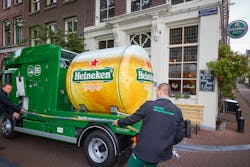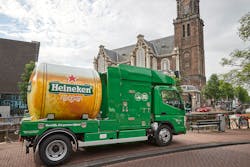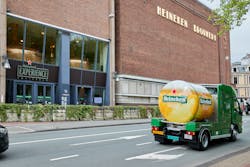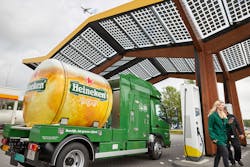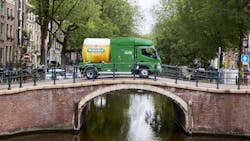Netherlands-based brewer Heineken is supplying cafés in the center of Amsterdam with what it says is the world’s first electrically powered mini tank truck.
The company’s goal is to make diesel fumes in the city “a thing of the past.”
“Heineken has a strong green ambition and we look at the entire chain,” said Hans Böhm, general manager. “Of course, this also applies to clean transport. I am pleased that we can now sustainably transport a large weight such as tank beer.”
In addition to helping to eliminate emissions, the electric mini-tanker also significantly reduces noise, Heineken said.
“This new mode of transport improves the quality of life for everyone who lives, works or visits the city center,” Böhm added. “An additional advantage is that, thanks to this leap forward, you can enjoy a beer even better on, for example, a terrace. I would rather hear smiling people and beautiful music than a roaring engine that also stinks and suffocates.”
The tank beer truck is smaller than its predecessor and therefore more maneuverable; which is beneficial for drivers and road safety. The tank beer truck “feeds” on green electricity, and with this Heineken says it does the “house color” even more justice than it previously did. Last August, the company also announced that all of its beer for the Dutch market is 100% green-brewed. The fact that the sustainability of transport is now being added to this is another milestone, and a prelude to further clean kilometers.
Loading and unloading
Electric transport is not without a struggle. While it is already common in passenger transit, it still is challenging to find sufficient pulling power in the goods segment. That development is taking place in full with the mini-taker, Heineken said. This does not alter the fact that the weight of the load has to be divided over several vehicles and journeys for the time being. For Heineken, a large tank truck with 200 hectoliters (5,283 gallon) of fresh beer drives from Den Bosch to the edge of the city. There, 30 hectoliters (793 gallon) are pumped over to the smaller and 100% electric tank beer truck, which provides approximately five cafes with fresh Heineken, Amstel or Brand beer, “whisper-quietly” and without emissions.
Once empty, the truck refuels on the edge of the city with electricity and beer to continue on its way to the heart of the city. The new trucks are lighter than their predecessors and meet the standard of up to 7.5 tons to protect quays and bridges. In this first phase, two electric tank beer trucks will be operating in Amsterdam. Heineken intends to make its vehicle fleet for urban distribution cleaner and quieter in the coming years.
Gaining green momentum
Because electric tank beer transport is relatively new, it was initially a bit of a search for the rules of the game. That, too, is part of pioneering, Heineken said. Before investing in electric beer transport as a brewer, it must be clear which dos and don’ts apply in the city center. At what times is it actually allowed to drive? Because more frequent trips to refuel electricity and beer also mean different driving times. What about the infrastructure for charging stations and parking? Thanks in part to the efforts of Alderman Egbert de Vries, the Municipality of Amsterdam and Heineken have united in the joint ambition to make the city cleaner and quieter.
“Supply is crucial for the city, but to keep Amsterdam livable and accessible, trucks must become cleaner, lighter, safer, and smarter,” said Egbert De Vries, Alderman traffic and transport, water and air quality for Amsterdam. “To achieve these goals, we recently launched Platform Logistiek020 together with the sector.
“We are looking at this together with companies like Heineken to the future of the city’s supply. The launch of the electric tank beer truck shows how companies can make an important contribution to the livable city that we can only realize together.”
Going for zero
Heineken’s step in electric transport fits in seamlessly with its “Logistics 020 Cooperation Agreement” introduced June 23. This agreement contains clear goals about improving road safety, protecting quays and bridges, the zero-emission zone for freight and delivery traffic that will come into effect from 2025, more living space, and clean air for residents of the city center. With Heineken’s move, its large tank beer trucks will disappear from the streets in the city center for good. Apart from the emissions in the city, safety and weight, with the new truck and the mobile city hub, Heineken says it will reduce CO2 emissions by more than 40% on the entire transport from the brewery in Den Bosch.
Better brewing
The step to supply tank beer in the center of Amsterdam with electric transport is part of Heineken’s “Brew a Better World” approach in which growth and sustainability go hand-in-hand. Heineken previously announced that cafes in Utrecht were “lighter, quieter, and cleaner.” The beer brewed in Zoeterwoude for export now is sent to the port of Rotterdam by electric container ship. Step-by-step, Heineken is becoming greener. In addition to green brewing and transport, Heineken also focuses on recycling packaging and promotional material and the reuse of materials after the closure or renovation of a catering business. The brewer aims to close the material cycles within 10 years.
The electric tank beer truck was made possible in part by Abrex, Daimler, Duotank, Fastned, TVE Reclameproducties and Veldhuizen.
